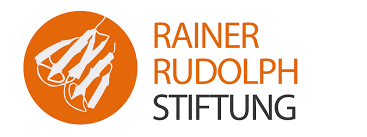Conferences supported by the Foundation
7th Halle Conference on Recombinant Proteins
The 7th Halle Conference on „Recombinant Proteins“ was held on October 13th/14th in the Leopoldina, the German National Science Academy. The conference has been established in 2003 by Rainer Rudolph and aims to ensure a crosstalk between applied and basic science. During the conference, the Rainer Rudolph Prizes 2022 were awarded to three young scientists. Download the programme of the 7th Halle Conference on Recombinant Proteins (pdf).
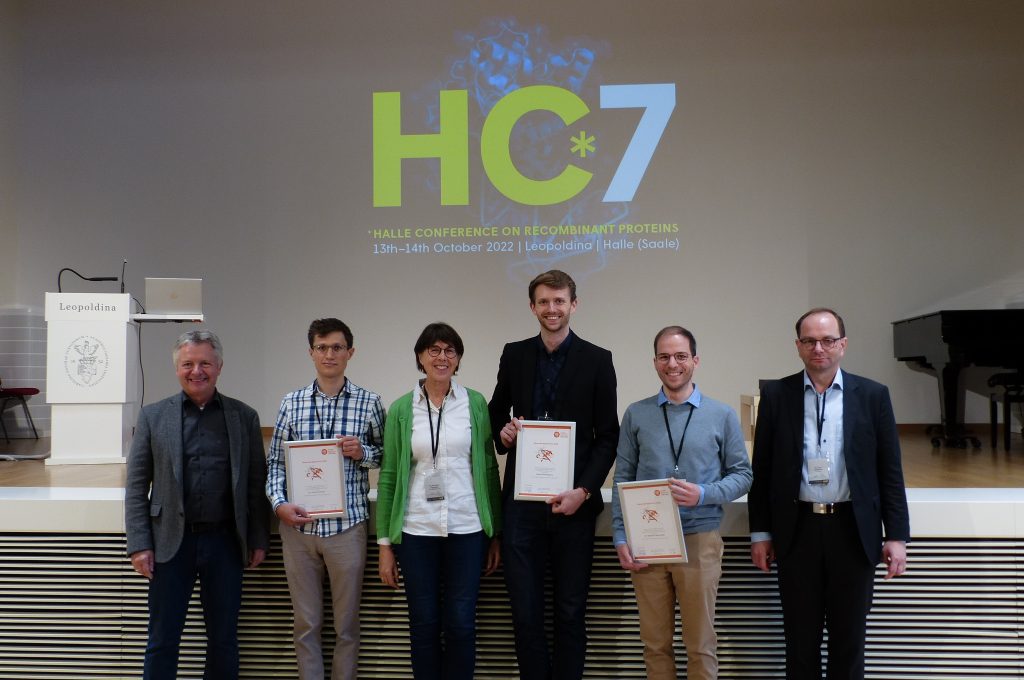
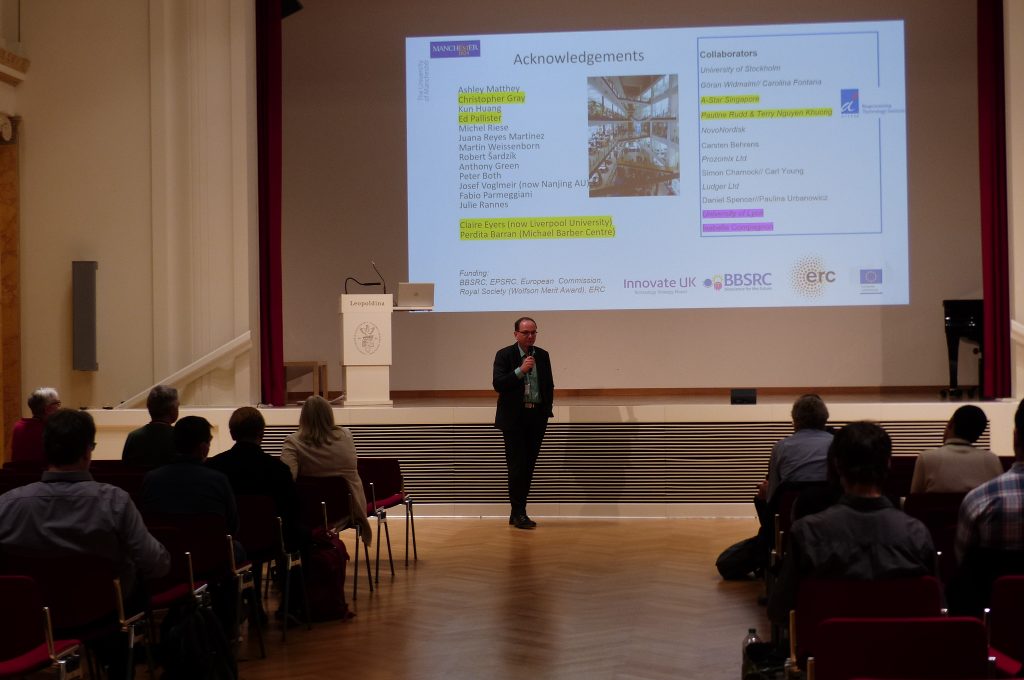
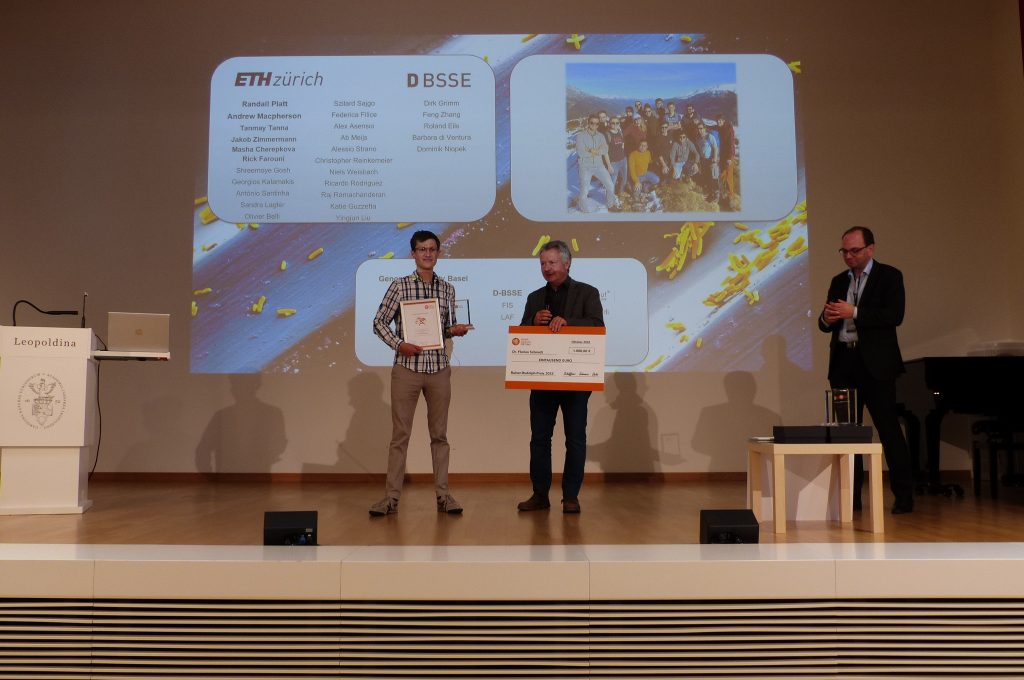
September 23rd/24th 2021: Symposium 10 Years Rainer Rudolph Foundation “Frontiers in Protein Science”
The Rainer Rudolph Foundation celebrated on September 23/24, 2021 with the symposium “Frontiers in Protein Science“ its 10th anniversary at Schloß Hohenkammer. Nominees for the Rainer Rudolph Prizes of the years 2020 and 2021 received the awards for their excellent scientific achievements (see picture on the right, below). Former awardees of the Rainer Rudolph prizes and invited speakers made the symposium to a highlight in the field of basic and applied proteinbiochemistry. Programme (pdf).
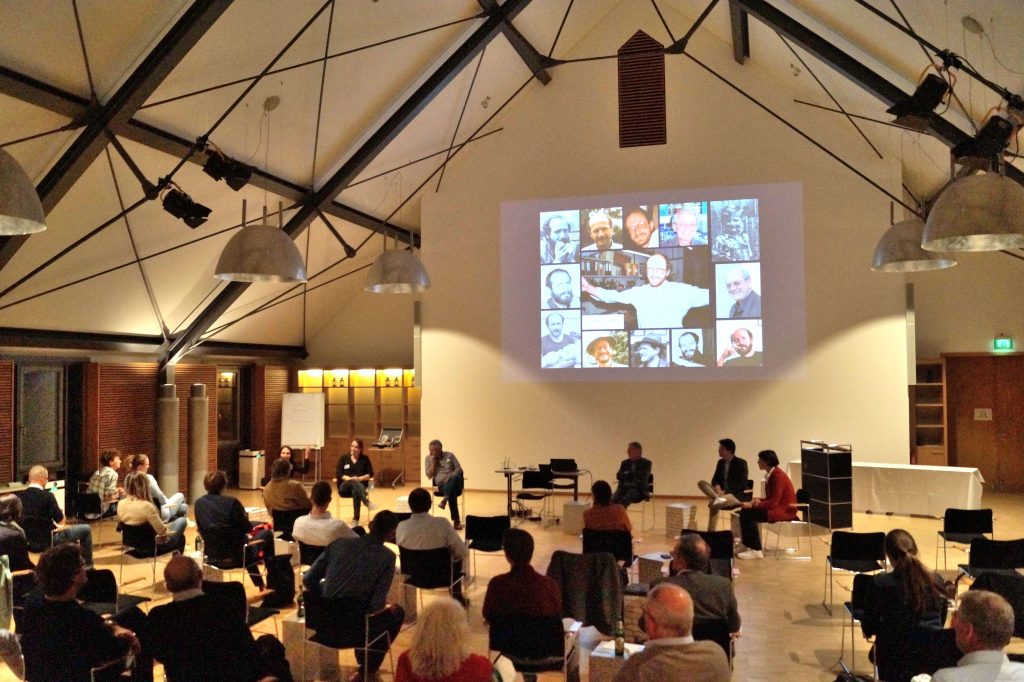
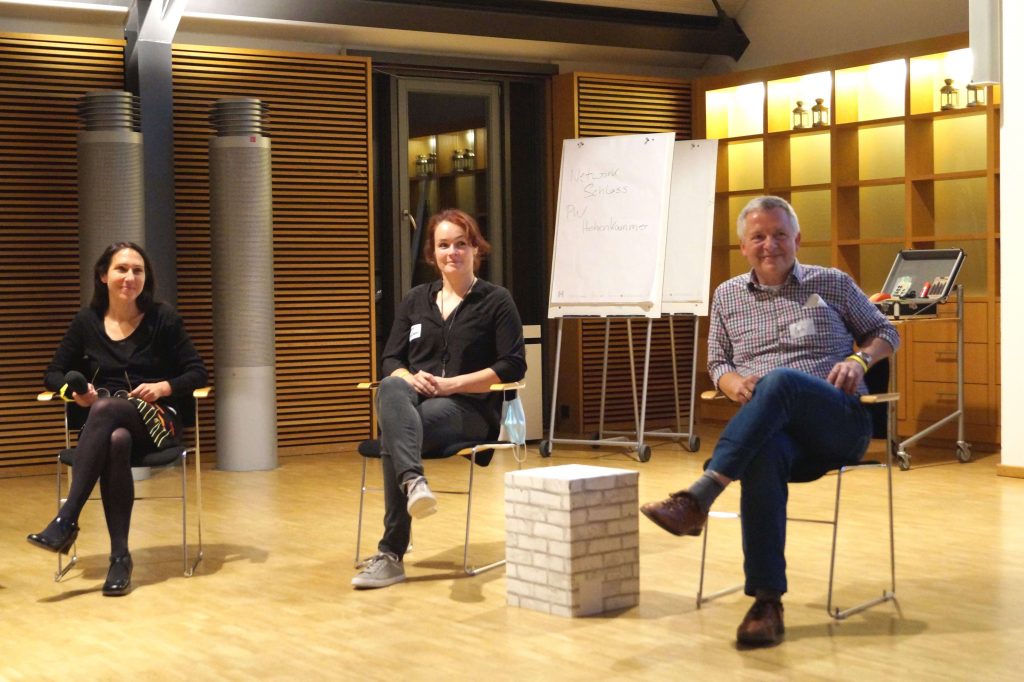
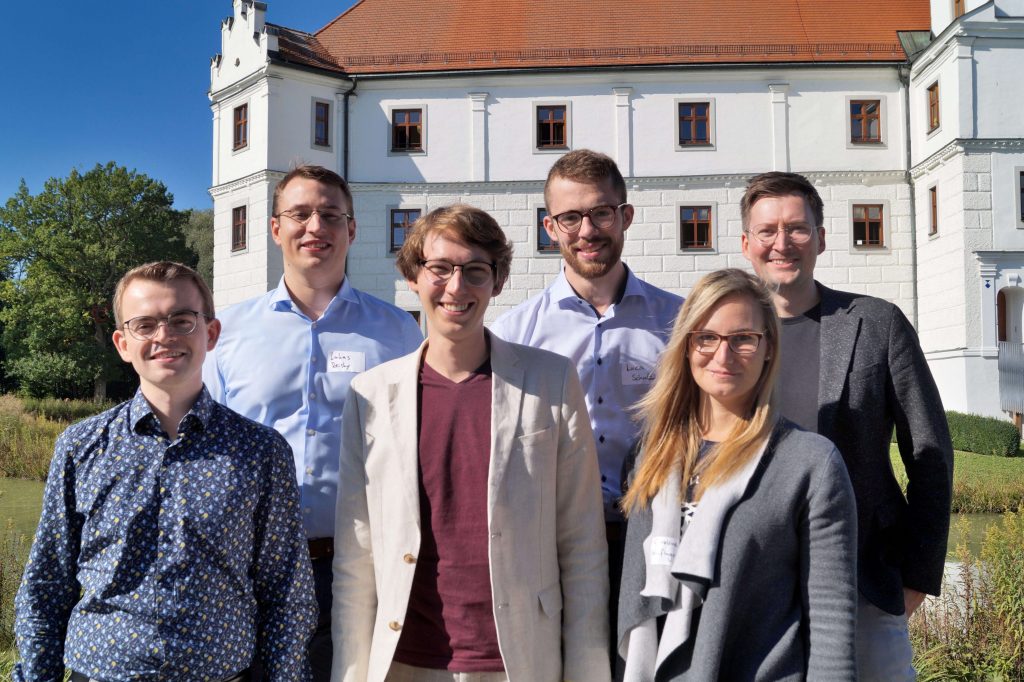
March 2018 – 6th Halle Conference on Recombinant Proteins
The 6th „Halle Conference on Recombinant Proteins“ took place on March 8 and 9 2018 in in Halle (Saale). For further information follow this link.
February 2015 – 5th Halle Conference on Recombinant Proteins
The 5th „Halle Conference on Recombinant Proteins“ was held on February 19th /20th in Halle (Saale). Further information can be obtained here.
The Halle Conference series was established in 2003 by Rainer Rudolph to promote interactions between scientists from academia and industry.
Rainer Rudolph Prize Award Ceremonies
Award Ceremony 2022
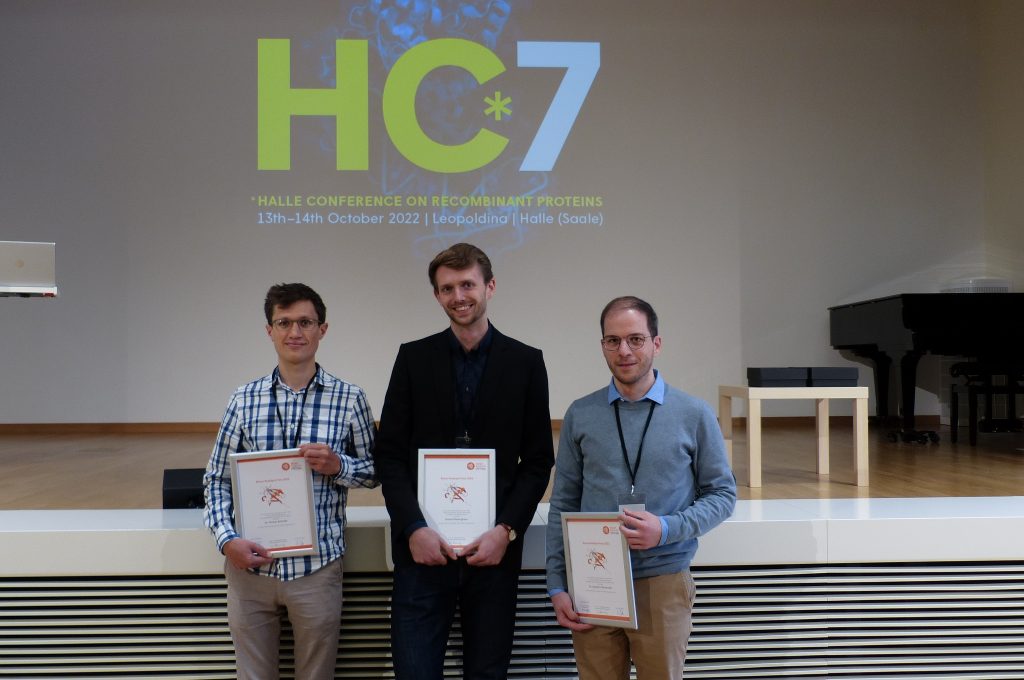
The Rainer Rudolph Prizes 2022 were awarded at the 7th Halle Conference on Recombinant Proteins. Benjamin Buchmuller (right) received the Rainer Rudolph Prize for his PhD work “Deciphering strand-asymmetrically modified CpG dyads in the DNA double-helix”. He analysed small engineered proteins for the detection of modified genomic nucleobases. Daniel Klewinghaus (middle) was awarded with the prize for his Master Thesis entitled “Bovine Ultralong CDR-H3 Antibodies for Effector Cell Redirection”. He studied novel antibody formats based on the ultralong CDR-H3 from cattle, generated in yeast. Florian Schmidt (left) received the prize for his results of his dissertation with the title: “Transcriptional recording by CRISPR spacer acquisition from RNA”. During his work, a novel Record-seq technology has been established that allows living microbial diagnostics.
Award Ceremony 2021
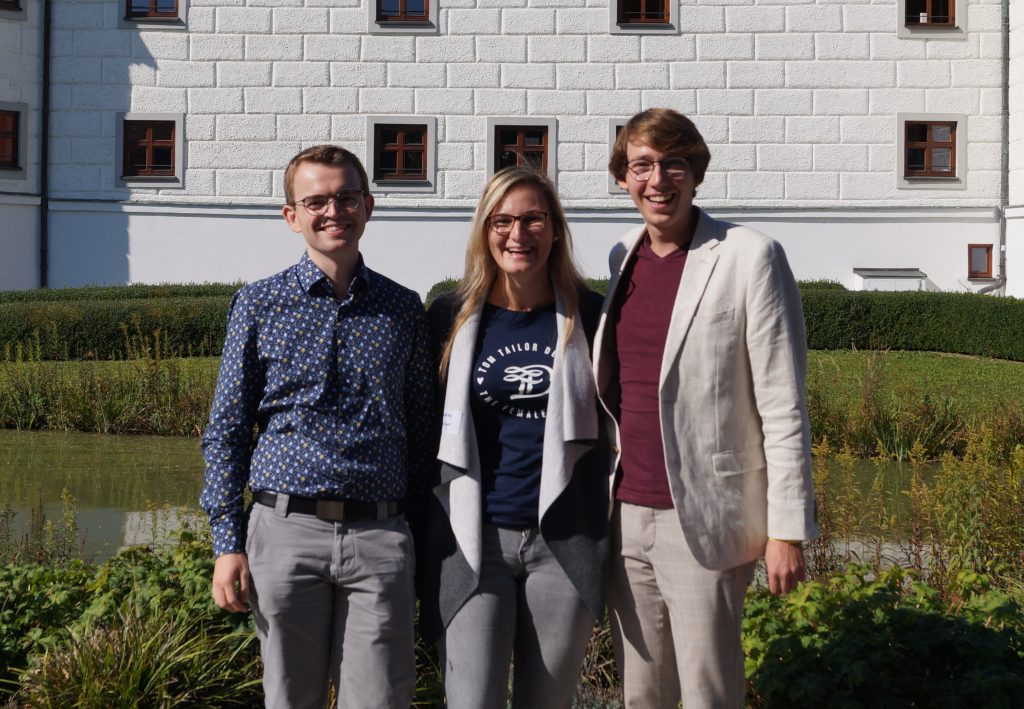
In 2021, the Rainer Rudolph Prizes were awarded to Caroline Hiefinger (middle) and Julian Kompa (right) for their excellent master theses and to Christopher Reinkemeier (left) for his outstanding PhD thesis. The nominees received the prizes during the anniversary celebration “10 Years Rainer Rudolph Foundation” at Schloss Hohenkammer on September 23rd.
Award Ceremony 2021 for Awardees from 2020
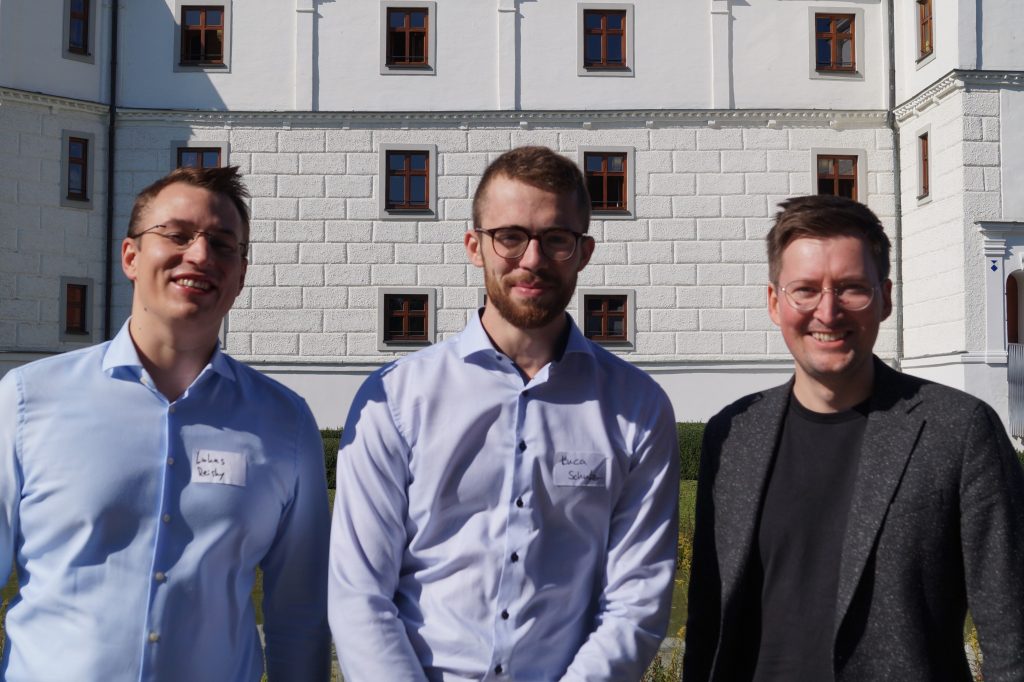
The Rainer Rudolph Prizes 2020 were awarded to Dr. Christoph Mårtensson (right), Dr. Lukas Reisky (left) for their excellent dissertations and to Luca Schulz (middle) for his outstanding master thesis. The award celebration was held during the symposium 10-Years Rainer Rudolph Foundation on September 23rd and 24th 2021 at Schloss Hohenkammer.
Award Ceremony 2019
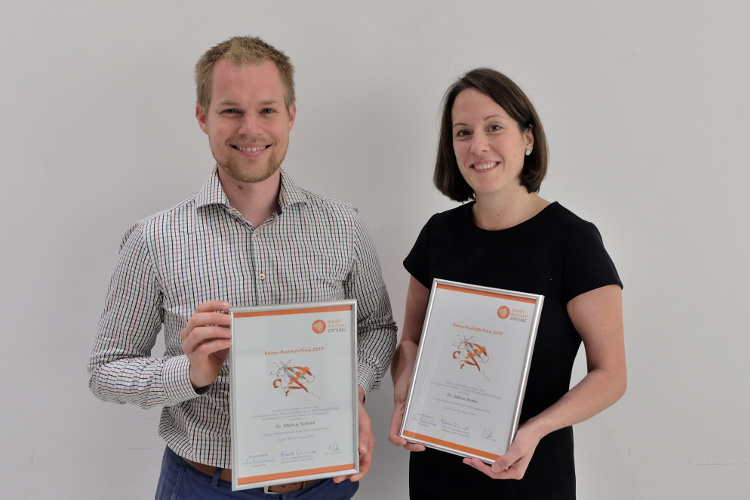
Sabine Studer was awarded for her dissertation “From structure to function – evolving de novo metalloenzymes”. Markus Schmid received the prize for his PhD work entitled “Development of an Adenoviral Gene Vector with Designed Shield and Adapter for Paracrine Delivery of Therapeutics”. The award ceremony was held in Zurch on August 20 2019 during the 13th symposium “Trends in Structural Biology”.
Award Ceremony 2018
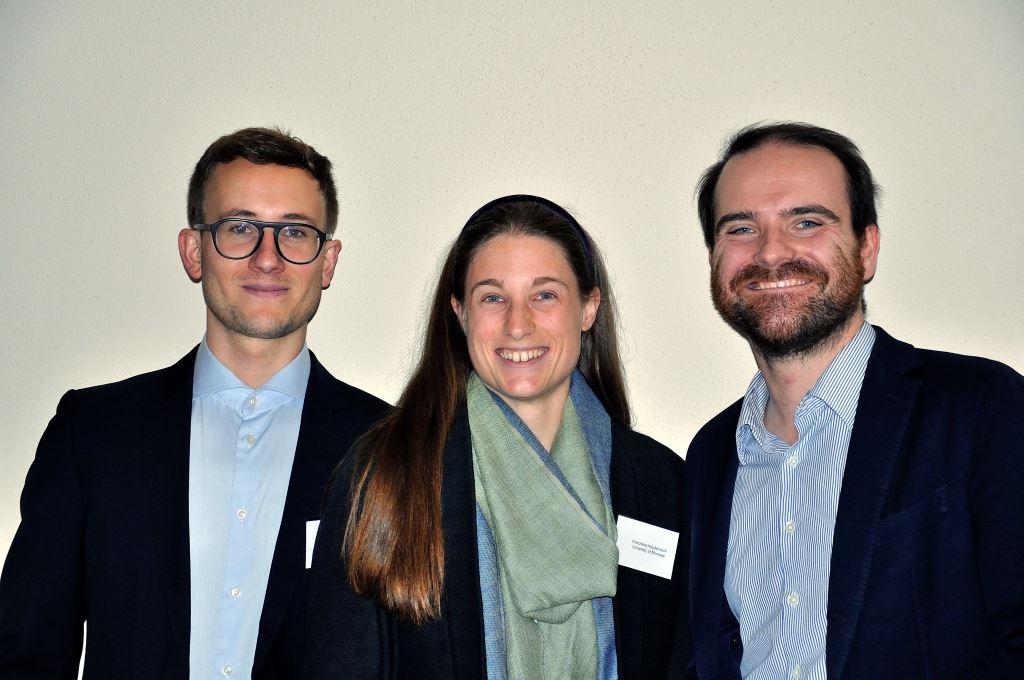
David Niquille (left) was awarded the prize forhis doctoral thesis “Reprogramming Nonribosomal Peptide Synthesis”. Franziska Heydenreich (middle) received the prize for her doctoral work entitled “The inner workings of a GPCR: molecular basis of biased G protein activation and beta arrestin recruitment”. Dominik Schumacher received the prize for his doctoral work entitled “Site-specific functionalization of antigen binding proteins for cellular delivery, imaging and target modulation”. The prizes were awarded during the “Faltertage” in Halle.
Award ceremony 2017
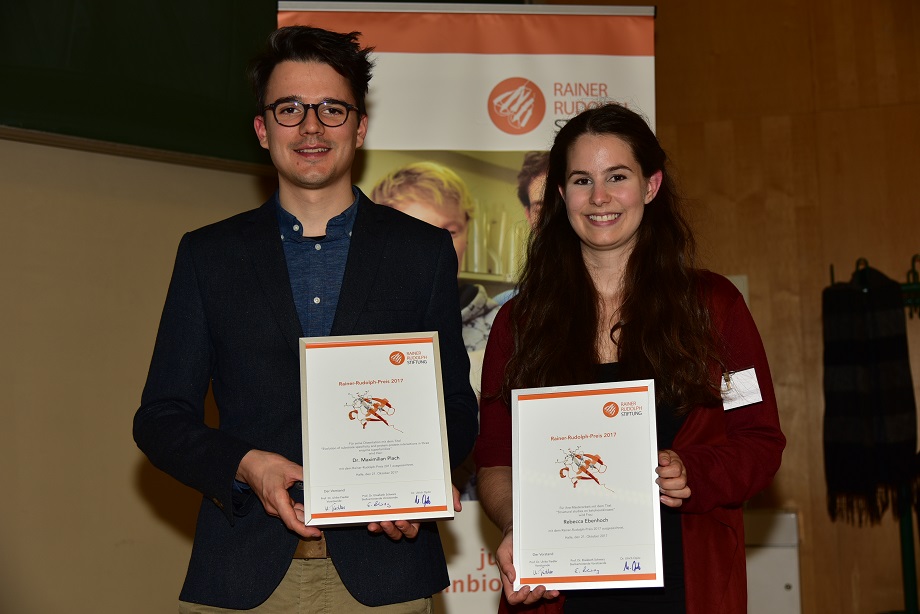
Max Plach received the prize for his dissertation entitled „Evolution of substrate specificity and protein-protein interactions in three enzyme superfamilies“. Rebecca Ebenhoch had performed the experiments for her Master thesis on the topic of Crystallographic analysis of the enzyme keto hexokinase (KHK) in different conformational states.
Award Ceremony 2016
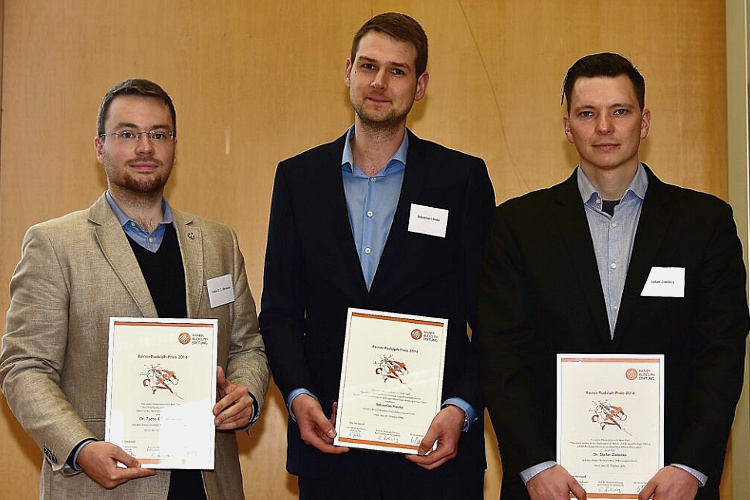
The prizes were awarded to Tycho Mevissen (left) for doctoral work with the title “The OTU Family of Deubiquitinases: Specificities, Mechanisms, and Applications”. Sebastian Hauke (middle) received the prize for his master thesis: “Specific Protein Labeling with Caged Fluorophores for Dual-Color Photoactivation and Super-Resolution Imaging in Living Cells”. Stefan Zielonka (right) was awarded with the prize for his PhD work entitled: “Shark Attack: Generation of mono- and bi-specific high-affinity vNAR antibody domains by step-wise affinity maturation”. THe ceremony took place in Halle during the Faltertage.
Award Ceremony 2015
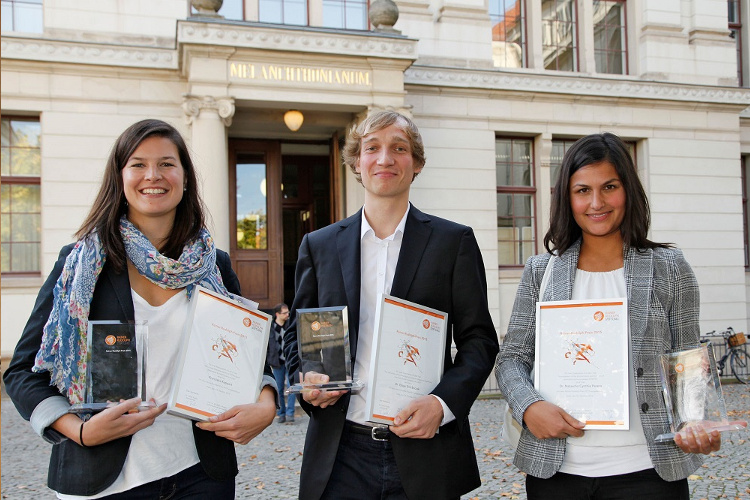
Rainer Rudolph Prizes of the year 2015 were awarded to 3 young scientists: Franziska Kappert (left) for her results obtained in her master thesis: “Structural characterization of the FGFR ligand interaction by NMR spectroscopy”, Edgar Boczek (middle) for his doctoral work “The maturation of Src kinase by the molecular chaperone Hsp90 and its specific cochaperone Cdc37”, Natascha Perera (right) for her dissertation “Investigation of the biochemistry and function of neutrophil serine protease 4 (NSP4)”. The ceremony was held in Halle during the Faltertage.
Award Ceremony 2014
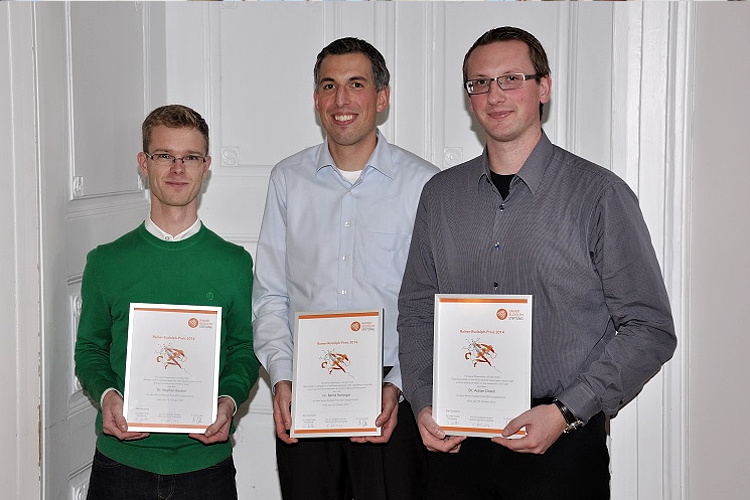
In 2014, the Rainer Rudolph Prizes were awarded to Stephan Barden (left) for his dissertion “Structural and Functional Analysis of the Pilus Protein CagL of the Helicobacter pylori Type IV Secretion System”. Bernd Reisinger (middle) received the prize for his PhD work on Mechanistic investigation of articially designed light reguation of naturally occurring, and and charactrization of ancestral (ßa)8-barrel enzymes enzymes”. Adrian Drazic was awarded for his PhD work entitled ” Characterization of the HOCl-specific transcription factor HypT and the effects of HOCl on the mechanism of E. coli“. The ceremony took place in Regensburg during the Faltertage.
Award Ceremony 2013
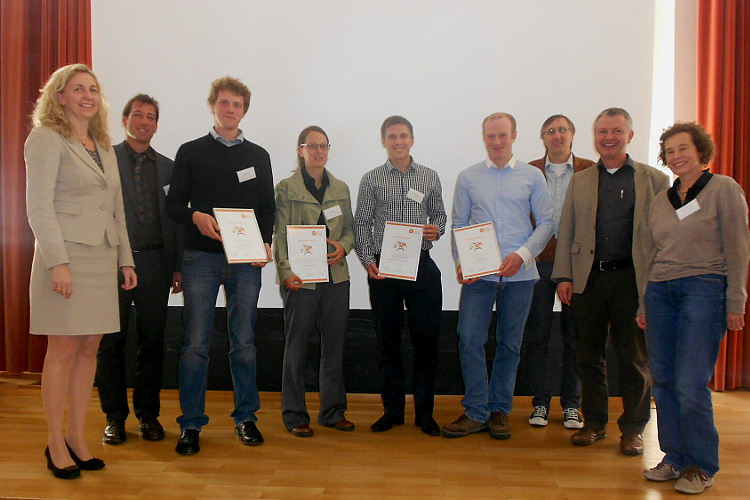
The Rainer Rudolph Prizes of the year 2013 were awared during the Faltertage in Regensburg. In this year, four young scientists (in the picture with award documents) received the prize: Matthias Müller for his doctoral work with the title: Mechanisms ofthe reversible enzymatic adenylation of Rab proteins” (left). Michaela Blech (second from left) “Structural and biophysical characterization of antigen:antibody binding and their potential biological implications in GM-CSF and interleukin-1ß signalling”. Joschka Bauer (third) for his master thesis “Characterization of spider silk proteins with non-repetitive amino terminal domains”. Tilman Plass (right) for his doctoral work “Development of a new technique for covalent labeling of proteins inside living cells”.
Award Ceremony 2012
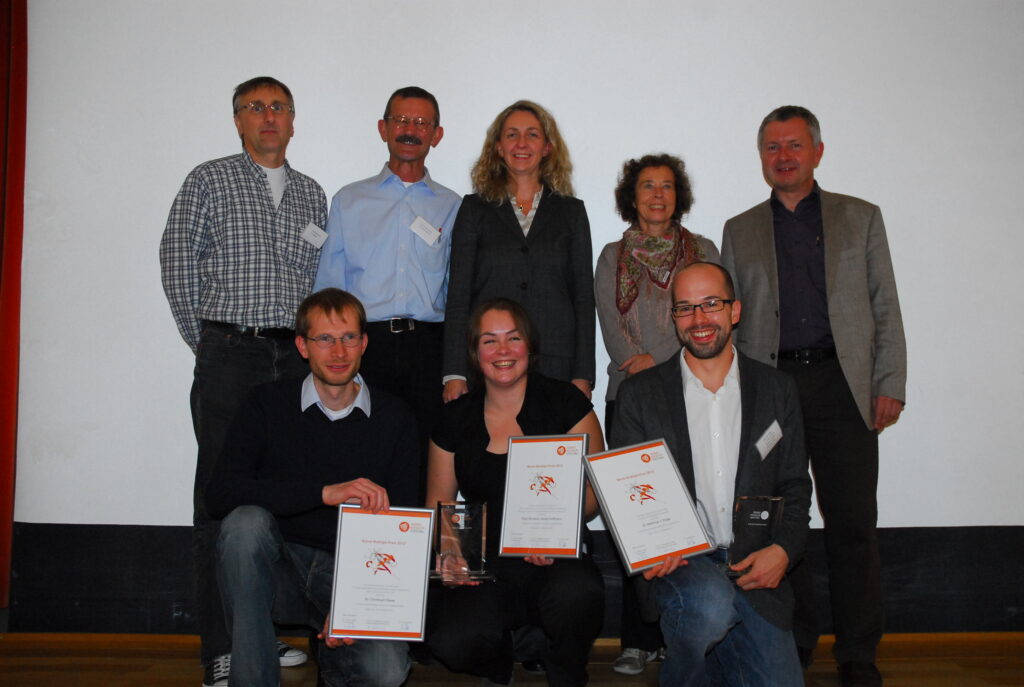
In 2012, the award ceremony took place in Regensburg, during the Faltertage. Christoph Giese (left, with award document) was awarded for his doctoral work with the title “A new single-step affinity purification system derived from type 1 pili of Escherichia coli“. Beate Hoffmann (middle, with award document) reci´eived the prize for her diploma work “Der humane glucagon-like peptide-1 Rezeptor: Expression, Renaturierung und funktionelle Rekonstitution in Nanodiscs” The human glucagon-like peptide-1 receptor: Expression, renaturation and functional reconstitution in nanodiscs”). Matthias Feige ( right, with award document) received the prize for his dissertation: “Faltung und Assemblierung von Antikörpern” (“Folding and assemby of antibodies”).

